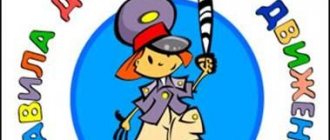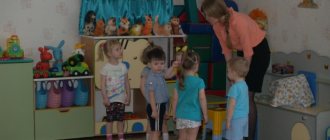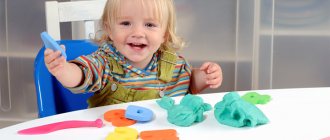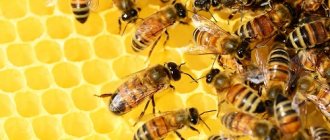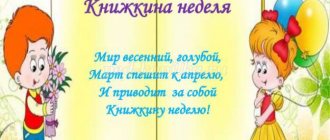S.A. Kamardina, teacher, ANO DO “Planet of Childhood “Lada”, kindergarten No. 66 “Matryoshka”, o. Tolyatti
Winner of the All-Russian competition “Healthy lifestyle - from childhood!”
In preschool childhood, the foundation of health is laid, its intensive growth and development occurs, basic movements, posture, necessary skills and habits are formed, and basic physical qualities are acquired. Hardening plays an important role in preserving and strengthening the health of children. How can we introduce preschoolers to the rules of hardening and teach them how to improve their health? Hardening is based on three basic principles: systematicity, consistency, and taking into account the individual characteristics of the child.
For several years, our kindergarten was a member of the creative group “Healthy Lifestyle” under the leadership of A.A., Candidate of Pedagogical Sciences, Associate Professor of Tolyatinsk State University. Oshkina. Under her leadership, a number of didactic games and manuals were developed to develop the foundations of a healthy lifestyle in preschoolers (the “Hardening” component).
Based on the material accumulated by the teaching staff, together with parents, the project “For health in kindergarten” was developed and implemented.
The project was implemented over five weeks.
Work with the project consists of four blocks: target; meaningful; operational; productive.
The target block is aimed at developing ideas about hardening as an element of a healthy lifestyle.
The content block is implemented in joint activities with children, conversations are held, reading fiction, watching videos in accordance with the topic, consolidation with parents at home, and a joint search for information about hardening.
The operating unit is implemented in all types of children's activities, the teacher introduces various attributes for play activities into the environment in accordance with the theme, makes attributes together with children, offers albums for viewing, books about hardening, coloring books, diagrams and algorithms for performing hardening procedures, game material ( massage mats, towels, etc.).
Effective block - children, together with their parents at home, get acquainted with such a component of a healthy lifestyle as hardening. Based on the impressions received, a baby book is made and a drawing is made. Parents present “Do-it-yourself massage mat.” They create presentations and videos for the topics of the week.
The theme of the weeks is revealed in various types of children's activities and in routine moments.
Pedagogical project “Healthy children are happy children!”
Page 1 of 2
Introduction
Type of project: Sports and recreational.
Project type: creative, practice-oriented.
Project implementation: Long-term.
2013 – 2014 academic year (September – May).
Project participants: senior children, parents, physical education instructor, music director, senior teacher, nurse, teachers.
Today, the changes taking place in society and in education place new demands on the nature and quality of relations between preschool institutions and families. The Law “On Education of the Russian Federation” states that preschool education is becoming an independent level of education and will be regulated by federal state educational standards. A special role is given to the family and it is emphasized that parents are the first teachers of their children, and a preschool institution is created to help them. Preserving and strengthening the health of preschool children is one of the most pressing problems of our time. The federal state standard of preschool education identifies the educational area “Physical Development”, the content of which is aimed at achieving the goals of developing children’s interest and value attitude towards physical education, harmonious physical development through solving the following specific tasks:
– development of physical qualities (speed, strength, flexibility, endurance and coordination);
– accumulation and enrichment of children’s motor experience (mastery of basic movements);
– formation in pupils of the need for physical activity and physical improvement.
Solving these problems, teachers of preschool educational institutions not only strive to ensure that children do not have illnesses, but also to ensure that children develop full physical and emotional well-being in harmony.
Currently, the state of health of children in our country is of serious concern to society. According to the Research Institute of Hygiene and Health Protection of Children and Adolescents of the National Center of Economics of the Russian Academy of Medical Sciences, in Russia, 60% of children aged 3 to 7 years have functional health problems and only 10% of children come to school absolutely healthy. Unfavorable environmental conditions lead to weakened immunity, and, as a result, to an increase in colds and infections. In an educational institution and at home, children spend most of their time in a static position (at the table, in front of the TV, computer, etc.) This increases the static load on certain muscle groups and causes them to fatigue. The strength and performance of skeletal muscles decreases, which leads to poor posture, curvature of the spine, and flat feet. An equally serious impact on the health and development of a preschool child is exerted by deviations in the musculoskeletal system, which are the root cause of many diseases that cannot be treated with medication.
We can say that the fate of society depends on how well the work with preschool children and children in the “risk zone” is organized. Modern society is aware of the need to strengthen children's health not only through medicine, but also through education.
Today the state’s attitude towards the family has changed, and the family itself has become different. The center of work on the full physical development and health of children should be the family and kindergarten as two main social structures that mainly determine the level of health of the child.
The Concept of Preschool Education emphasizes: “The family and kindergarten are chronologically connected by a form of continuity, which facilitates the continuity of the upbringing and education of children. However, a preschooler is not a baton that the family passes into the hands of teachers. What is important here is not the principle of parallelism, but the principle of interpenetration of two social institutions. The most important condition for continuity is the establishment of trusting business contact between the family and the kindergarten, during which the educational position of parents and teachers is adjusted.”
Everyone knows that even the best physical education and health program will not be able to give full results if it is not implemented together with the family, if a child-adult community (children - parents - teachers) is not created in the preschool institution, which is characterized by assistance to each other, consideration the capabilities and interests of everyone, their rights and responsibilities.
An important task in educating the younger generation has always been and remains the education of patriotism and citizenship, since this is the basis of the viability of any society and state, the continuity of generations. In the implementation of this task, a special place is given to tourism and local history activities, which allows the child, through thematic walks, excursions, hikes, to get acquainted with his land, study his small homeland, and learn the patriotic, labor, and moral traditions of the people. During tourism and local history activities, on campaigns, patriotic feelings and impulses are carried out with particular force and leave a deep mark on the young soul. Such complex, strong feelings mature gradually, they are strengthened and deepened by the parents’ attitude towards what surrounds the person.
To raise a child competently, it is necessary to have unified educational influences on him from all adults, to take into account the age and individual characteristics of the child, and to understand what he should know and be able to do at this age. But as practice and scientific research show, parents often make typical mistakes in raising children and experience certain difficulties. The task of a physical education instructor is to help parents in the physical education of their children. Strengthening and developing the interaction between kindergarten and family provides favorable living conditions and upbringing of the child, forming the foundations of a full-fledged, harmonious personality. The main value of pedagogical culture is the child: his development, education, upbringing, social protection and support for his dignity and human rights.
The relevance of this topic is that all parents want to see their child healthy, strong, physically developed, loving his family and Motherland. Caring for the environment, family, and one’s health must begin from preschool age. Most parents understand perfectly well that movement is necessary for normal growth, good health and moral well-being. In our opinion, local history tourism trips will contribute to this.
Maintaining in children a positive attitude towards an active lifestyle, and in the future the desire to maintain and strengthen their health are important components of upbringing in the family. The best way to introduce a child to a healthy lifestyle is to show by example how to approach physical education and sports. If a child sees that their parents enjoy healthy, active leisure, they will definitely imitate them.
The best way to organize interaction between a physical education instructor and parents is to create an effective system of cooperation. It is the parents who make up the child’s first social environment and are the main educators, on whose position the child’s development largely depends.
Formulation of the problem
Currently, the main problem of preschool childhood is the poor physical development of children upon entering kindergarten. The overall picture is this: children experience a “motor deficit”; age-related development of speed, agility, coordination of movements, endurance, flexibility and strength is delayed. Children are overweight and have poor posture, as a result of which they are visually clumsy, baggy, have sluggish gestures and facial expressions, drag their legs behind them when walking, feel stiff, insecure, have their heads down, and have no pride in their posture.
A survey of parents of children who attend kindergarten showed that parents have insufficient knowledge of how to strengthen their child’s health through hiking, physical exercise, hardening, and outdoor games. They often protect their children from physical exertion (“don’t run, don’t jump, don’t climb, otherwise you’ll fall, sit”), even from healthy competition in outdoor games.
These indicators determined the relevance of the chosen topic, the purpose of which was to preserve and strengthen the health of children of senior preschool age through tourist walks.
To achieve this goal, the project objectives were defined:
1. Create conditions for physical education and recreational work in preschool educational institutions using non-traditional equipment.
2. To develop in children vital motor skills and abilities that contribute to emotional self-expression and emancipation of children during hiking trips
3. Improve children’s conscious attitude towards physical education and health activities.
4. Enrich parent-child relationships when conducting joint events, while paying special attention to preserving and strengthening the physical health of children of senior preschool age through hiking trips
Hypothesis : The physical qualities of children will effectively develop, and their health will be maintained and strengthened, provided that a system of working with children on physical education and health improvement is developed by a physical education instructor together with parents of preschool children.
Research base: MKDOU “Kindergarten “Smile”.
Organization of the environment:
- equipment for the gym and sports ground: gymnastic wall, gymnastic corner, gymnastic benches and boards, cubes, hanging ladders and ropes, arches of different heights.
- aids for conducting outdoor control and internal affairs activities: gymnastic sticks, flags, handkerchiefs, ropes, cubes, plumes, medicine balls, skittles, rings, rubber balls (of different sizes), massage balls, hoops (of different diameters).
Expected result:
Parents:
- enriching parent-child relationships in joint physical education activities;
- increasing interest in the life of kindergarten;
- increasing the physical education and health literacy of parents.
Children:
- reduction in morbidity rates;
- increasing the level of physical fitness;
- awareness of the need for physical education, sports and a healthy lifestyle.
Project implementation stages:
- Stage I – organizational;
- Stage II – preparatory;
- Stage III – basic – practical;
- Stage IV – final.
Work on the project includes the activities of teachers, children and parents. It is distributed as follows by project stages.
| Implementation stages | Forms of work | date |
| Organizational | Identifying parental requests in this area; Analysis of literary sources, materials; Analysis of the level of physical development and health of children; Questioning parents; Identification of the level of knowledge of parents in the area of physical education and health; Selection of methodological literature, videotapes, CDs; Setting goals and formulating objectives; Creation of a draft model of interaction between a physical education instructor and parents to increase the effectiveness of work on the physical development and health of children | September 1-2 week 2013 academic year |
| Preparatory | Development of a calendar-thematic plan for working with children and a plan for working with parents; Discussion of the work plan with parents at a meeting; Familiarization of parents with the organization of a health-preserving and physical culture-improving environment in kindergarten; Organization of the parent club "Yagodka" Drawing up plans for physical education and health activities within the framework of project activities; Development of notes for physical education events; Manufacturing of necessary attributes and equipment | September 3-4 week 2013 academic year |
| Practical | Cooperative activity physical education instructor and children within: — organization of directly organized educational activities, sporting events; Cooperative activity physical education instructor with parents: — organizing interaction between children and parents according to the project implementation plan; — holding entertainment, leisure, holidays, excursions, exhibitions of drawings, crafts, photo exhibitions; - parent meetings, conversations, meetings, consultations with parents and educators; — design of poster information, travel folders for parents, card indexes; Functioning of the parent club "Yagodka" | October-May 2013-2014 academic year |
| Final | Analysis of physical education and health work with children and parents: Final observation of the level of physical development and health of preschool children; Conducting a survey of parents to determine the effectiveness of teamwork; Report on the results of the project at the final parent meeting; Joint physical education holiday “Children’s Day”: — assistance from parents in preparing, organizing and holding the holiday; - showing parents the fairy tale “Naughty Dasha”; organizing an exhibition of joint child-parent creativity | April May -2014 academic year |
Project implementation
Due to prevailing economic reasons and busyness at work, modern parents devote most of their time to issues of financial support for the family, thus, the child’s natural need to move in the family, albeit unconsciously, is suppressed. And, having started taking their child to a preschool institution, parents often shift responsibility for their physical education onto the shoulders of teachers.
It is possible to properly raise a healthy child only when the uniform requirements of the kindergarten and family in matters of education, health improvement, daily routine, and development of motor skills are met.
Thus, the further search for effective ways to preserve and strengthen the health of preschool children should include increasing the role of parents in improving the health of children, introducing them to a healthy lifestyle, and creating traditions of family physical education. An important place in solving these socially significant problems is occupied by a kindergarten, which can act as a kind of center for promoting a healthy lifestyle, nurturing a family culture, and developing in parents knowledge, skills and abilities on various aspects of preserving and promoting the health of both children and adults.
The functions of parents in organizing the physical education of children:
The functions of parents in organizing the physical education of children can be grouped as follows:
- creating the necessary material and technical conditions for studying at home;
- monitoring and facilitating children’s compliance with the daily routine, personal hygiene rules, hardening, morning exercises and homework;
- direct participation in health days, sports leisure activities, physical education and music festivals, games, entertainment, walks, excursions, family team competitions.
Project implementation principles:
- the principle of science (reinforcement of all ongoing activities aimed at improving health with scientifically based and practically proven methods);
- the principle of activity and consciousness (participation of the entire team of teachers and parents in the search for new, effective methods and targeted activities to improve the health of themselves and their children);
- the principle of complexity and integrativeness (solving health problems in the system of the entire educational process of all types of activities);
- the principle of targeting and continuity (maintaining connections between age categories, taking into account different levels of development and health status);
- the principle of effectiveness and assurance (realization of children’s rights to receive the necessary help and support, guarantee of a positive result regardless of the age and level of physical development of children);
- the principle of diversified personality development (intensifying the mental activity of children, creating conditions in which the child himself seeks a rational solution);
- the principle of humanization (physical education and health activities are based on comfort, taking into account the desires and moods of children);
- the principle of individuality (providing a healthy lifestyle for each child, taking into account his health, interest, selection of optimal physical activity);
- the principle of cyclicality and systematicity (gradually increasing the load as physical fitness increases);
- the health-improving principle (ensuring a rational general motor regime, alternating motor and cognitive activity of children in productive activities);
- the principle of relationship with the family (compliance with the uniform requirements of the preschool educational institution and the family in raising a healthy child and involvement in health-preserving and recreational activities and their evaluation).
Forms and methods of project implementation
| Visual information block | Information and familiarization block | Block - Parents' club "Healthy": |
Information stands for parents “Health Corner” and “Fizkult-Ura”
Information stand for parents with photos of past events “It’s good in our garden!” Card files of outdoor games Issue of valeological newspapers "Mailbox" “Methodological piggy bank” - poems, riddles, fairy tales and stories about family, sports | Speech by a physical education instructor at parent meetings:
"Our achievements" Consultations and conversations on physical education and health topics:
Open Day:
Questioning:
| Joint physical education and health activities of parents with a physical education instructor:
Assistance in organizing “Days of Interesting Meetings” - excursions and walks Assistance in preparing, organizing and holding “Birthdays” Manufacturing of sports equipment and paraphernalia Exhibitions of crafts and drawings |
Integration of educational areas
The project allows you to integrate information from different fields of knowledge to solve a problem and apply it in practice.
Integration of the educational field “Physical Development” with other areas
Integration with the educational field “Socio-communicative development”:
To interest parents in the development of children's play activities, ensuring successful socialization and the assimilation of gender behavior. Create motivation to preserve and create family sports traditions, involve in drawing up a cooperation agreement and interaction plan. Recommend using every opportunity to communicate with the child, the reason for which may be the child’s achievements and difficulties in physical development. Encourage help to establish relationships with peers. Involve parents in cooperation that is varied in content and form - participation in the activities of the parent club, preparation for sporting events. To promote the development of free communication between adults and children through joint physical education activities.
Integration with the educational field “Cognitive Development”:
To orient parents to the development of their child’s need for cognition by reading fiction about sports. Show the benefits of walks and excursions that evoke positive emotions. Hold competitions and games with your family.
Integration with the educational field “Speech Development”:
Recommend and guide parents in choosing feature and animated films aimed at developing interest in sports. Involve parents in project activities (designing albums and collages, illustrated together with children on a sports theme).
Integration with the educational field “Artistic and Aesthetic Development”:
Organize exhibitions of family art on a sports theme, highlighting the creative achievements of adults and children. To reveal the possibilities of music as a means of beneficial “impact on a child’s mental health.” Show parents the influence of family leisure (holidays, entertainment) on the development of parent-child relationships. Involve parents in various forms of joint physical education and musical activities with children in kindergarten.
To the beginningBack1ForwardTo the end
Healthy lifestyle, health. Projects – Project “I take care of my health”
Publication “Project “I am Health...” Relevance: The task of early formation of a culture of health is relevant, timely and quite complex. Every year the percentage of children with health problems increases, and the trend towards a continuous increase in the overall morbidity rate among preschool children increases. Need in…
Image library "MAAM-pictures"
Pedagogical project “Healthy food is a guarantee of health” MBDOU d/s “Zhuravushka p. Narva” Senior preparatory group “Healthy food is a guarantee of health” Pedagogical project Preserving the health of children in the process of education and training is a priority task facing teachers of MBDOU d/s “Crane” p. Narva. Formation…
Pedagogical project “It’s great to be healthy!” in the educational field “Physical Development” Relevance of the project. The problem of deteriorating health of the younger generation has become increasingly relevant in recent years. The kindergarten is currently faced with the acute question of ways to improve health promotion, movement development and in general...
Health-saving project for children of senior preschool age “A healthy mind in a healthy body” Relevance of the topic. The most pressing problem today is preserving and strengthening the health of children. Health is considered as complete physical, mental and social well-being, as a harmonious state of the body, which allows a person to be active...
“Being healthy is great!” Projects on how to instill this valuable thought in children.
Contained in sections:
- Healthy lifestyle, health. All about health for children 36147
- Projects. Project activities 67291
Includes sections:
- Vitamins. Projects 317
- Health Day. Projects 44
- Teeth, dental care. Projects 97
- KGN, hygiene. Projects 245
- Medicinal plants. Projects 135
- Microbes and viruses. Projects 48
- Health week. Projects 158
- Proper and healthy nutrition. Projects 374
- Profession doctor, clinic, hospital. Projects 99
- Human body, sense organs. Projects 80
By groups:
- Senior group
- Preparatory group
- Middle group
- Junior group
Showing publications 1-10 of 3529. All sections | Healthy lifestyle, health. Projects
New
Photo
The best
Project “Colorful health of girls and boys” Project “Colorful
health of girls and boys ” Purpose of the project : to develop motivation in children for healthy lifestyle , increase the level of knowledge and enrich the experience of parents about a healthy lifestyle through relationships. Project type : creative, gaming;
By... Project of health work with children “Balls are different” Relevance: In our gym there is a lot of different sports equipment - hoops, jump ropes, mats and much more, but most of all children like to play with balls. To the question “What types of balls are there?”
the children answered: football, volleyball, massage. But the question is, “How do all these...
